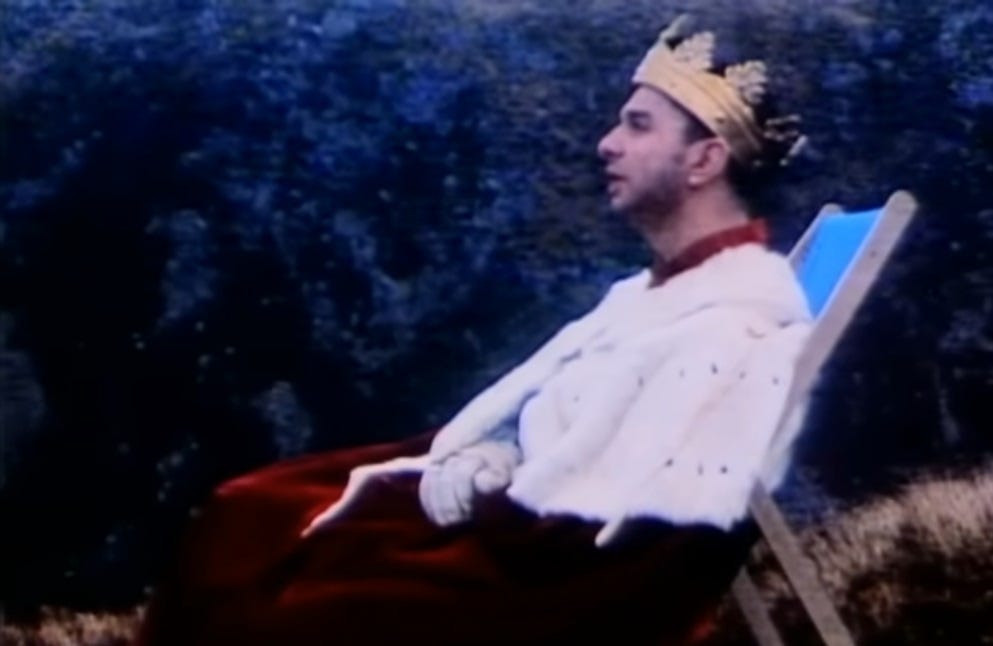Senate Dems Introduce 'No Kings Act' To Remind Supreme Court We Ain't Got No Kings
Nae king! Nae quin! Nae laird! Nae master! We willna' be fooled again!
In a legislative reply to last month’s Supreme Court decision granting Donald Trump (haha, sure, any US president, riiiiiight) immunity from prosecution for “official acts” in office, however crimey they might be, Senate Majority Leader Chuck Schumer on Thursday introduced what he’s calling the “No Kings Act.” The bill declares that US presidents and vice presidents have no immunity from criminal law, regardless of whether they’re currently in office or living in disgrace in a trash palace. That was the case right up until last month, although the Justice Department has since the Nixon years held that sitting presidents can’t be prosecuted until they leave office.
"Given the dangerous and consequential implications of the Court’s ruling, legislation would be the fastest and most efficient method to correcting the grave precedent the Trump ruling presented," Schumer, D-N.Y., said in a statement. "With this glaring and partisan overreach, Congress has an obligation — and a constitutional authority — to act as a check and balance to the judicial branch."
In addition to the immunity thing, the bill also states that Congress alone has the authority to decide “to whom federal criminal laws may be applied," not the Supreme Court’s collection of employees of Federalist Society billionaires.
The bill’s title is a not-at-all subtle reference to Justice Sonia Sotomayor’s dissent, in which she said the majority’s opinion meant that “in every use of official power, the President is now a king above the law.”
Just to stick a finger in the eye of the Court, the legislation also attempts to limit the Supreme Court’s ability to strike down the law as unconstitutional, as Schumer explained in his statement summarizing the bill:
The bill would allow Presidents and Vice Presidents to challenge the constitutionality of the No Kings Act in the United States District Court for the District of Columbia. Any appeal would be handled by the United States Court of Appeals for the District of Columbia Circuit. Using the Exceptions Clause of Article III of the Constitution, Congress would preclude the Supreme Court from hearing any appeals to these challenges. It would further remove the Supreme Court’s appellate jurisdiction to interfere with any criminal proceedings involving Presidents or Vice Presidents on the basis that an alleged criminal act was an official action.
The bill has 34 Democratic co-sponsors in the Senate, which is pretty impressive as a statement of opposition to the Supremes’ overturning of the basic idea that nobody is above the law.
Obviously, with Republicans currently in the control of the House, and the filibuster still very much in place in the Senate, the No Kings Act isn’t going to be passed this year, and while Yr Doktor Zoom is a doktor of rhetoric, not law, the provision attempting to put the bill out of reach of Supreme Court interference sounds sketchy to us, even as we appreciate its audacity.
Then again, if the Supreme Court is going to make up its interpretations of the Constitution as it goes along, the bill seems fairly tame by comparison. Really limiting the Court’s power would probably require a constitutional amendment, for which Dems would need a supermajority in both Congress and in the state legislatures, which at the moment they don’t have.
Then again, if Republicans insist on being weird fascists, that sort of backlash isn’t entirely out of the realm of possibility, now is it?
PBS Newshour / NBC News / No More Kings Act / Senate Democrats / subhed quotation from Terry Pratchett.
Yr Wonkette is funded entirely by reader donations. If you can, please become a paid subscriber, or if you would rather make a one-time donation, here is your button:





When Terry Pratchett novels understand democracy better than the Supreme Court, it's ... typical
OT- JD Vance likes to piss off his wife so she'll "make him" sleep on the couch